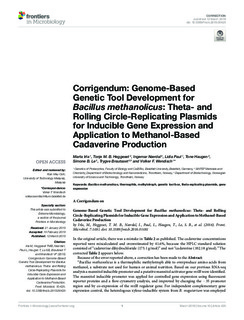| dc.contributor.author | Irla, Marta Katarzyna | |
| dc.contributor.author | Heggeset, Tonje Marita Bjerkan | |
| dc.contributor.author | Nærdal, Ingemar | |
| dc.contributor.author | Paul, Lidia | |
| dc.contributor.author | Haugen, Tone | |
| dc.contributor.author | Le, Simone Balzer | |
| dc.contributor.author | Brautaset, Trygve | |
| dc.contributor.author | Wendisch, Volker F. | |
| dc.date.accessioned | 2020-02-10T11:51:38Z | |
| dc.date.available | 2020-02-10T11:51:38Z | |
| dc.date.created | 2020-01-03T13:10:25Z | |
| dc.date.issued | 2019 | |
| dc.identifier.citation | Frontiers in Microbiology. 2019, 10 . | nb_NO |
| dc.identifier.issn | 1664-302X | |
| dc.identifier.uri | http://hdl.handle.net/11250/2640675 | |
| dc.description | © 2019 Irla, Heggeset, Nærdal, Paul, Haugen, Le, Brautaset and Wendisch. This is an open-access article distributed under the terms of the Creative Commons Attribution License (CC BY). The use, distribution or reproduction in other forums is permitted, provided the original author(s) and the copyright owner(s) are credited and that the original publication in this journal is cited, in accordance with accepted academic practice. No use, distribution or reproduction is permitted which does not comply with these terms | nb_NO |
| dc.description.abstract | Bacillus methanolicus is a thermophilic methylotroph able to overproduce amino acids from methanol, a substrate not used for human or animal nutrition. Based on our previous RNA-seq analysis a mannitol inducible promoter and a putative mannitol activator gene mtlR were identified. The mannitol inducible promoter was applied for controlled gene expression using fluorescent reporter proteins and a flow cytometry analysis, and improved by changing the −35 promoter region and by co-expression of the mtlR regulator gene. For independent complementary gene expression control, the heterologous xylose-inducible system from B. megaterium was employed and a two-plasmid gene expression system was developed. Four different replicons for expression vectors were compared with respect to their copy number and stability. As an application example, methanol-based production of cadaverine was shown to be improved from 6.5 to 10.2 g/L when a heterologous lysine decarboxylase gene cadA was expressed from a theta-replicating rather than a rolling-circle replicating vector. The current work on inducible promoter systems and compatible theta- or rolling circle-replicating vectors is an important extension of the poorly developed B. methanolicus genetic toolbox, valuable for genetic engineering and further exploration of this bacterium. | nb_NO |
| dc.language.iso | eng | nb_NO |
| dc.publisher | Frontiers | nb_NO |
| dc.rights | Navngivelse 4.0 Internasjonal | * |
| dc.rights.uri | http://creativecommons.org/licenses/by/4.0/deed.no | * |
| dc.subject | Bacillus methanolicus | nb_NO |
| dc.subject | Thermophile | nb_NO |
| dc.subject | Methylotroph | nb_NO |
| dc.subject | Genetic tool box | nb_NO |
| dc.subject | Theta-replicating plasmids | nb_NO |
| dc.subject | Gene expression | nb_NO |
| dc.title | Corrigendum: Genome-Based Genetic Tool Development for Bacillus methanolicus: Theta- and Rolling Circle-Replicating Plasmids for Inducible Gene Expression and Application to Methanol-Based Cadaverine Production | nb_NO |
| dc.type | Journal article | nb_NO |
| dc.type | Peer reviewed | nb_NO |
| dc.description.version | publishedVersion | nb_NO |
| dc.source.pagenumber | 2 | nb_NO |
| dc.source.volume | 10 | nb_NO |
| dc.source.journal | Frontiers in Microbiology | nb_NO |
| dc.identifier.doi | 10.3389/fmicb.2019.00425 | |
| dc.identifier.cristin | 1765875 | |
| cristin.unitcode | 7401,80,1,0 | |
| cristin.unitname | Bioteknologi og nanomedisin | |
| cristin.ispublished | true | |
| cristin.fulltext | original | |
| cristin.qualitycode | 2 | |

